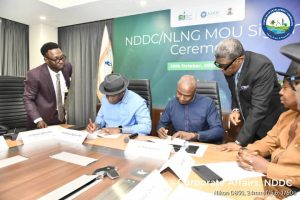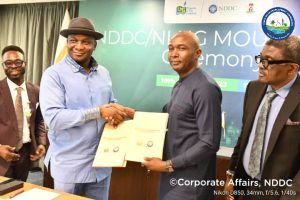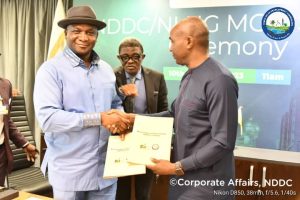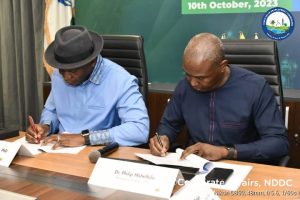*By Aniekan Ekpo*
The recent Memorandum of Understanding (MOU) signed between the Niger Delta Development Commission (NDDC) and Nigeria Liquified Natural Gas (NLNG) marks more than a bureaucratic formality; it stands as a symbol of hope and progress in the Niger Delta region. This collaboration under the Public-Private Partnership (PPP) initiative showcases the potential and power that arises from the unity of government agencies and private corporations, offering valuable lessons for International Oil Companies (IOCs) operating in the area.
This partnership emphasizes the significance of collaboration, breaking down traditional barriers and advocating for synergy between government and private entities. The story here is not just about working together; it is about utilizing local resources inclusively and sustainably. By leveraging the abundant natural gas resources in the Niger Delta, the NDDC-NLNG collaboration demonstrates a commitment to driving development that benefits both the corporate bottom line and the communities that have historically been impacted.
IOCs are urged to take inspiration from this approach and explore ways to harness local resources for the greater good. The partnership serves as a shining example of the effectiveness of Public-Private Partnership models, showcasing tangible proof of their impact. It encourages IOCs to consider similar collaboration approaches by combining their expertise, resources, and networks with government agencies, local communities, and other stakeholders.
What sets this partnership apart is its unwavering commitment to social and environmental responsibility. It acknowledges that progress should not come at the expense of the environment or the well-being of local communities. IOCs are urged to prioritize sustainable practices, investing in initiatives that contribute to the well-being and development of the communities they serve.
This collaboration signals a shift away from short-term gains and quick fixes towards a long-term commitment to the development of the Niger Delta and beyond. The focus on education, healthcare, and infrastructure development underscores the need for a holistic approach to sustainable growth.
At its core, the partnership underscores the importance of stakeholder engagement and inclusivity. It serves as a call for IOCs to actively involve local communities, government agencies, civil society organizations, and other relevant stakeholders in decision-making processes. This ensures that initiatives align with the real needs and aspirations of the people they impact.
In conclusion, the NDDC-NLNG partnership goes beyond a contractual agreement; it represents hope and progress in a region marked by conflict and neglect. IOCs in similar regions should heed the lessons: collaborate, leverage local resources, embrace public-private partnerships, prioritize social and environmental responsibility, commit to the long-term, and engage stakeholders inclusively. By doing so, IOCs can become catalysts for transformation, driving sustainable growth, empowering communities, and leaving a legacy that extends beyond financial gains. The time for change is now, and IOCs are poised to play a leading role in this remarkable chapter of development.















